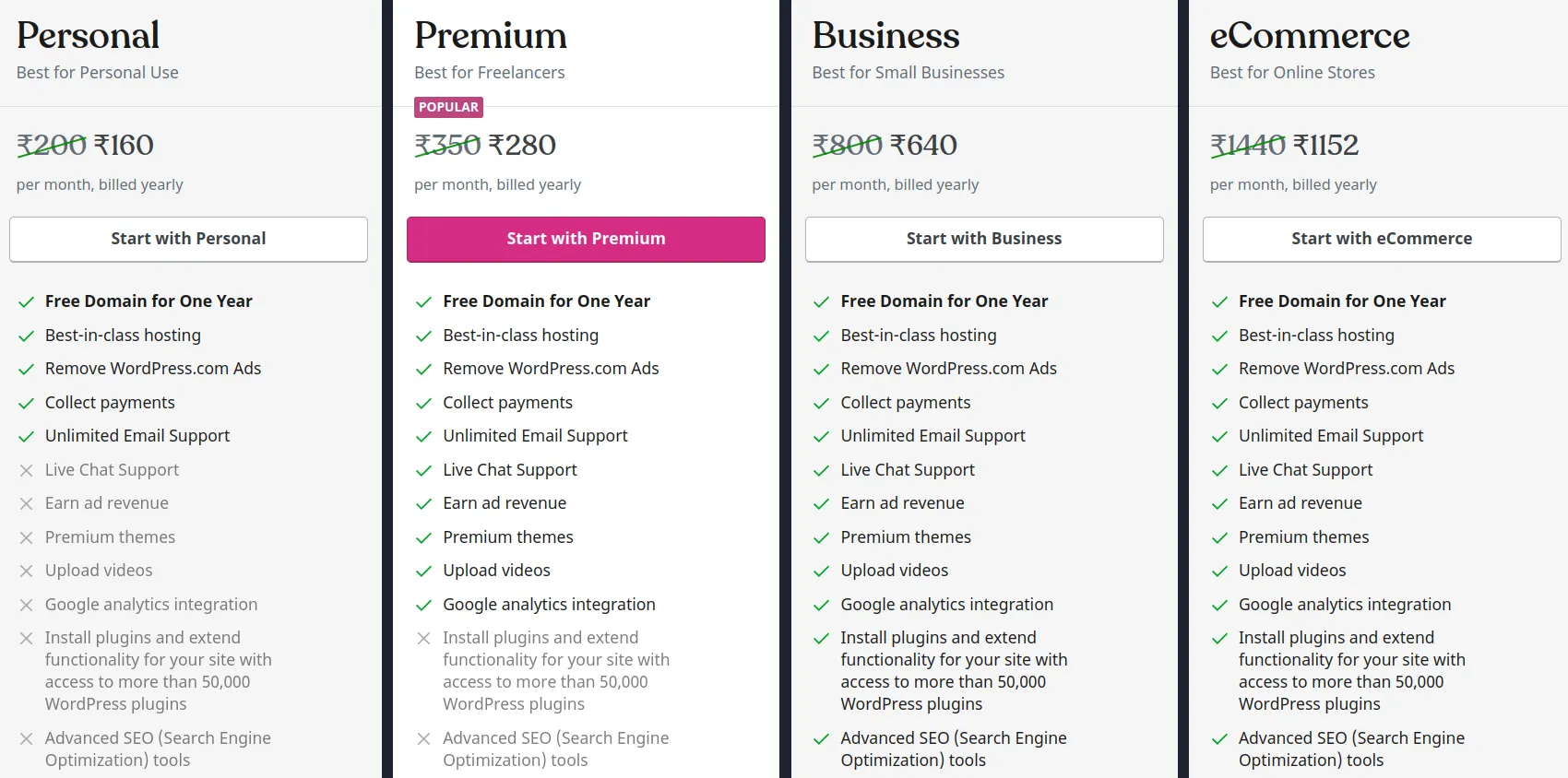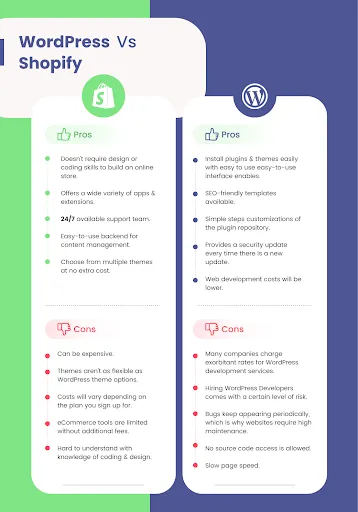As per Statista, in 2021, retail eCommerce sales amounted to approximately 4.9 trillion U.S. dollars globally. This figure is expected to grow by 50 percent over the next four years, reaching about 7.4 trillion dollars by 2025. With platforms like WordPress and Shopify, today it is easier for businesses to create an online store.
WordPress has long been the leading platform for starting a website, while Shopify is well known as an easy way to set up an online store and start selling products or services immediately. There are many great reasons to choose either of these platforms, but they come with pros & cons that you should consider while deciding which way to go. WordPress vs. Shopify, which is best for your business? In this blog, we will compare both, so you can determine which will be right for your requirement.
Quick Overview
Shopify and WordPress are two of the most popular eCommerce platforms on the web. When choosing which platform to use for your site, it’s important to weigh factors such as cost, scalability, and design focus. Let’s inspect and compare WordPress vs. Shopify to help you make an informed decision.
WordPress & Shopify offer free plans available to users, but they differ in functionality. While you can build an online store on both platforms, WordPress is geared more towards bloggers and website owners than those looking to launch an online store. You’ll need to use a theme designed for eCommerce if you want your site to sell products or services.
Both platforms can create your website, but WordPress is the more versatile option. It’s free to download, easy to install & edit yourself, and there are many plugins (like WooCommerce) that you can use to build an online store. WordPress Website Services Company will guide you through setting up a business page with great content and then implement Search Engine Optimization techniques to rank it on search engines for the specific product or service you offer.
In contrast, Shopify is a turnkey solution. It’s not free, but you don’t have to do anything other than plug in your content to get your store up and to run. It has many add-ons and partners that care for things like marketing, design, and customer service. It means you’re paying a monthly fee and won’t be able to control every element of your business like with WordPress.
Also Read: Top 25 WordPress Development Companies to Hire
Setup & Hosting In WordPress & Shopify
WordPress
WordPress Vs Shopify, which one has better setup and hosting features? Let’s start with WordPress. You’ll need to download and install the software on your web hosting. Once you have a hosting account and the installation is complete, you’ll be able to log in to your dashboard. Here, you will find all of your WordPress settings. You’ll be able to upload themes from here, manage plugins and build a network of users who can log into your site and edit content without breaking anything.
In WordPress, a theme controls your website’s design. Once you’ve logged into your dashboard, you’ll be able to upload a new theme and customize its settings by changing background images, uploading custom header graphics, and inputting text into content areas. These themes come with unique features, such as sidebars that can be managed within specific post types to include different ads or calls-to-action throughout different posts.
For starters, WordPress is entirely open-source. You can download the program to your computer and run it there (or on a hosting provider). You’ll pay just a one-time license fee and, most times, nothing to host it. Plus, if you’re working with a theme from outside the WordPress store (like from somewhere like ThemeForest), you’ll need to install the theme manually.
It takes about ten minutes for anyone who knows what they’re doing; some of that time is just connecting files properly. Setup and hosting in WordPress are free, but you must deal with updates. Themes are also free in most cases, but you’ll have to handle updates yourself. And when you want an add-on like WooCommerce for selling goods online, you’ll need to purchase that.
Also Read: How will WooCommerce CMS Help You To Grow e-Commerce Business
Shopify
One important aspect to remember when comparing WordPress vs Shopify is that a hosting service is required to run WordPress. Shopify provides both hosting and a customizable storefront. If you own an eCommerce website, using one service that manages everything makes sense to spend more time building your business.
Hosting in Shopify also includes security features like firewalls and malware scanning, unlimited bandwidth, storage space, and data transfer. With a hosted site on Shopify’s platform, you get automatic backups each day, which means if something happens to your site, there will be a copy stored offsite just waiting for restoration! No need to worry about manually backing up files or managing your server’s storage space.
Your business needs will dictate what platform would work best for you. It is worth considering the traffic your site generates, how frequently content updates are needed, whether you have technical skills, and how much control over design and branding you want to have before making a decision.
Setup & Hosting |
|
|
WordPress |
Shopify |
|
Theme controls your website’s design |
Provides both hosting and a customizable storefront |
|
Hosting in WordPress includes features like a free certificate, SSL, eCommerce Optimization, and regular backups, DDoS Protection |
Hosting in Shopify also includes security features like firewalls and malware scanning, unlimited bandwidth, storage space, and data transfer |
| Offers automatic updates daily |
Offers automatic backups each day |
Security & Support In WordPress & Shopify
WordPress
Another important consideration is the site’s security. WordPress sites are typically more secure than those running on other platforms because over 50% of the internet’s websites use the platform. Plus, as a self-hosted platform, WordPress has a stronger safety net since you can update it as needed. And if something goes wrong on your WordPress site, you’re equipped with tools to diagnose and fix it quickly.
With WordPress, you can use free and open-source software, although your site will not be hosted on a secure server unless you upgrade to a paid plan. If you want more options for customization and support, then it’s best to Hire WordPress Developers to build your online store. It’s important to consider WordPress hosting cost, too; it might prove difficult if you don’t have a developer who can set up all of these components.
Shopify
Security is also an issue with both WordPress and Shopify. While it’s not unheard of to be hacked, many security breaches happen due to mistakes made by those running a website, such as installing third-party plug-ins that introduce vulnerabilities into your site or failing to keep your software up-to-date. It is essential to keep everything up-to-date at all times. If you are not sure how to do it yourself, then consider hiring someone who does.
In Shopify, your data is encrypted through SSL and hosted on the fast and secure Amazon Web Services platform, making your website secure. You get more control over your content because you don’t have to edit the code to make changes on your site- an important aspect that may save time and headaches in the long run. If a technical issue arises with your website, help is available 24/7 to resolve any problems.
WordPress & Shopify: Price Comparison
As an open-source content management system, WordPress costs nothing . You can set up a free website and blog within minutes. It has four level plans, Personal, Premium, Business, and eCommerce, that help you grow your business with the help of an error-free website.

Shopify offers four levels of monthly plans: Starter, Shopify, Advanced, and Shopifyplus for enterprise-grade solutions. The first two are the least expensive. The advanced plan includes 24 hours of support.

For a more cost-effective option, consider Shopify. You won’t get live customer support with a standard account, but you do have access to their large knowledge base. For $14 per month on a basic plan or $29 per month on an unlimited plan, you can have your domain name and website with ease of use, similar to WordPress.
Help & Support
Security is also an issue with both WordPress and Shopify. While it’s not unheard of to be hacked, many security breaches happen due to mistakes running a website, such as installing third-party plug-ins that introduce vulnerabilities into your site or failing to keep your software up-to-date. It is crucial to keep everything up-to-date at all times. If you aren’t sure how to do it yourself, then consider hiring someone who does.
In Shopify, your data is encrypted through SSL and hosted on the fast and secure Amazon Web Services platform. This makes your website more secure than if you used WordPress. Additionally, you have more control over your content because you don’t have to edit the code to make changes on your site- an important aspect that may save time and headaches in the long run. If a technical issue arises with your website, help is available 24/7 to resolve any problems.
On the other side, WordPress is just as important to install reliable plugins and keep them updated. Instead of paying monthly fees, WordPress Website Services Company charges per hour, which can add up quickly depending on the complexity of your project.
WordPress security and support offers three layers of protection against hackers – file system level security, brute force login protection, and firewall protection from denial of service attacks.
You will always have access to online resources (forums) to solve problems without paying monthly hosting fees. You will never need to bother about downtime as every hosting provider provides a 99% uptime guarantee, but you should take steps to protect your site with a backup plan before launching, so there are no surprises if something goes wrong.
Search Engine Optimization
When it comes to SEO, there are some differences in terms of technology and focus. WordPress is a blogging platform primarily built around optimizing content for Google. In contrast, Shopify is designed primarily as an eCommerce store builder, so while they have options for creating content like blogs and galleries within their site, their focus is mostly on providing the best experience possible for shoppers.
Both platforms offer integrations with platforms like Google shopping ads or Facebook ads. But since each has a different design philosophy, these integrations might not work the same way. While both platforms can build online stores, each allows you to host and share your content. So if you are struggling to decide on WordPress Vs Shopify, consider your requirements; you may need to determine where you are currently in your blogging journey.

Market Tools & Features
In comparing WordPress vs Shopify, now let’s look at the market tools and features of each platform. Both offer unique tools & features that might or might not meet your business requirement. For a better understanding, let us look at the features of both platforms and decide which one best suits your business:
Shopify:
- You can start the online store without investing much money, which is good news if you are running on a shoestring budget.
- You can have your store functioning in minutes using what’s known as a theme. It’s a website template designed to be easy to install. It will save you work hours because all you have to do is add content, images, and prices.
- Shopify doesn’t offer a lot of integrations. It offers apps from Google and Facebook so that you can sync your social media accounts with your storefront.
- Businesses that need more than just those two integrations (like MailChimp) might want to consider another provider like Bigcommerce or Squarespace.
- Both platforms allow customers to buy anything from physical goods to digital products.
WordPress:
- WordPress is open-source and available to download for free, so if you’re interested in using it to power your website, you can do so without having to pay a dime or commit any money upfront.
- WordPress also has an active community of developers and bloggers who are always updating the platform with new features and improvements on the go, which means that the software will never grow outdated over time.
- There is no shortage of plugins compatible with the core WordPress program, as well as a variety of other third-party products that help automate everything from SEO management to shipping logistics.
- WordPress is best suited for individuals with little to no programming experience who want a free way to manage their online store. On the flip side, those looking for more advanced features should look into Shopify instead.
- Themes are essential when designing a professional-looking website. WordPress offers a range of pre-made themes (free and paid), but there are still not quite as many options available compared to Shopify.
Also Read: Top 10 Reasons Why WordPress is the Best CMS
Pro & Cons of Shopify
|
S. No. |
Pros |
Cons |
| 1. |
You don’t need design or coding skills to build an online store on Shopify. |
It can be expensive if you’re not careful when setting up your store – they offer paid plans and premium packages that range in price. |
| 2. |
It offers various apps and extensions you can use for customization. |
While there are a lot of different themes to choose from, they aren’t as flexible as WordPress theme options |
| 3. |
The support team is available 24/7, so there’s always someone to answer your questions. |
Costs will vary depending on the plan you sign up for and the payment terms. This can run more than buying a domain name, hosting package, and installing WordPress. |
| 4. |
Easy-to-use backend will save you tons of time with content management. |
eCommerce tools are limited to what’s offered by Shopify without additional fees. (This varies as per the selected plan). |
| 5. |
Ability to choose from multiple themes for a professional look at no extra cost. |
Not easy to understand for those who do not know to code. Its eCommerce tools may limit what you can do without paying for additional features. |
Pro & Cons of WordPress
| S. No. |
Pros |
Cons |
| 1. |
It offers an easy-to-use interface that enables users to install plugins & themes easily. It has various drag-and-drop editors that allow users to customize their website’s layout with a few clicks. |
WordPress development comes at a cost. Many companies charge exorbitant rates for WordPress development services. |
| 2. |
Search Engine Optimization (SEO) friendly templates are available, making it easier for you to get your site up in Google’s search results. |
Hiring WordPress Developers comes with a certain level of risk. You cannot assure whether these programmers will work efficiently enough to provide desired outputs and complete tasks within deadlines. |
| 3. |
WordPress customization can be done by following simple steps in the plugin repository or theme marketplace. |
Maintaining your site using WordPress requires continuous effort as bugs keep appearing periodically. |
| 4. |
It provides a security update every time there is a new update, which makes it safe from any cyber attack or hacking incident. |
There is always a cost to ensure your site runs smoothly. There will be technical issues for which you will need to hire someone from outside to fix those issues. |
| 5. |
Web development costs will be lower when you opt for WordPress developers rather than hiring someone else who doesn’t know much about this CMS. |
No source code access is allowed in this CMS. If you are looking for a developer who can modify your WordPress codebase and apply custom modifications. |
Which Platform is Better for your eCommerce Store?
WordPress vs Shopify has been the ongoing debate among small business owners. Many argue that WordPress is a free and more personalized option, while others tout the many benefits of Shopify as being more robust and reliable. Ultimately, it depends on your specific needs.

Evaluate what you expect from your site, how much time you want to spend on it, and what features are most significant to you before deciding which platform to use. If you’re still unsure about which platform would be best for you, we recommend talking with an expert who can help make sense of all the pros and cons!
Conclusion:
After reading this blog post, I hope you are more informed about the best platform to choose when developing an eCommerce store. Keep in mind that WordPress and Shopify both have benefits and drawbacks. Your business goals should be a primary consideration when deciding which eCommerce platform is right for you, sSo it’s important to weigh those before deciding. If you decide to Hire WordPress Developers, we’re happy to help!





